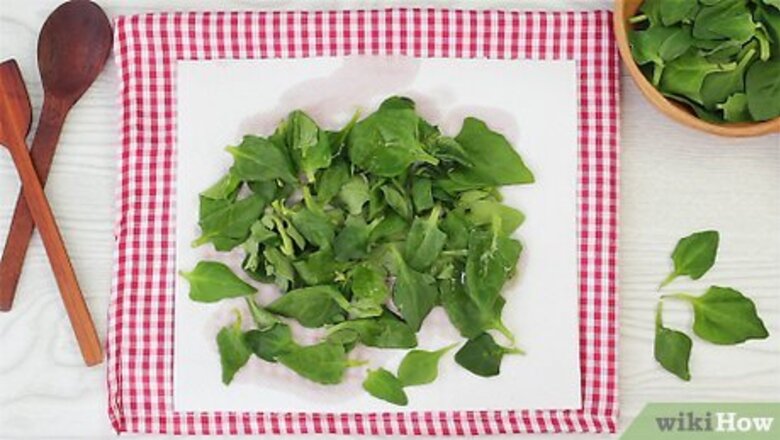
views
X
Expert Source
Jennifer Lease, RD, CDNRegistered Dietitian & Trained Chef
Expert Interview. 15 September 2021.
Learn a few of the common ways to cook this versatile ingredient.
Cooking Fresh Baby Spinach
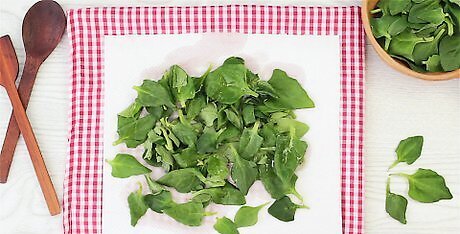
Rinse and dry the spinach. Fill a bowl or clean sink with your fresh baby spinach and enough cool, clean water to cover it. Swish the spinach around to clean it, then remove it to dry with a towel. After moving the spinach around in the water, avoid further agitation so that any dirt removed from the leaves can settle to the bottom. Remove the spinach by hand or with tongs after washing so that you can dispose of the dirty water. Repeat if necessary. You can dry the spinach in a salad spinner if you have one, but patting it dry on a clean towel or paper towel should be all that is necessary to remove most excess water.
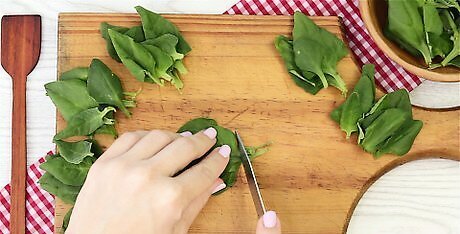
Cut the spinach if you wish. Remove the stems of the leaves if you prefer not to eat them, and cut the leaves into pieces if you wish or if your recipe calls for it. The stems are perfectly edible, but can be slightly tougher or stringier than the leaves when eating. If you cook down your spinach to a soft texture, you will likely not even notice this difference. In addition to any cutting, the baby spinach will reduce its size on its own when cooking.
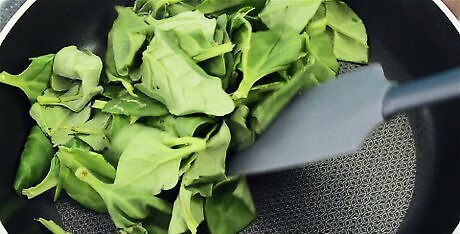
Saute the spinach in a skillet. Place your rinsed and dried baby spinach into a skillet or other pan and stir or turn until it is cooked evenly. You may cover the pan with a lid for faster cooking. Saute the spinach over medium heat. You may add oil or butter first, but the water content of the spinach will quickly be released and prevent it from sticking to the pan on its own. Continue to stir or turn the spinach with a spatula or tongs until all leaves are heated evenly, appear wilted, and turn a bright green. Fresh baby spinach reduces in size considerably as it cooks. You can add more spinach to the pan as it cooks down and makes more space, if desired.
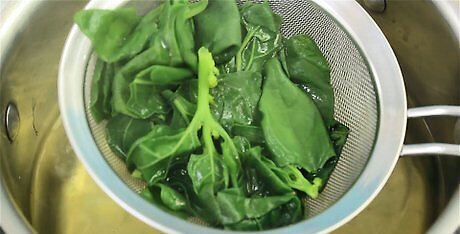
Try boiling your spinach. Place your rinsed and dried baby spinach into a pot and cover it with water. Bring the water to a boil and cook for one minute before removing. You can boil the spinach for longer than a minute, but it will quickly get tender and turn a bright green after very little time. After boiling, pour the contents of the pot into a colander to drain.
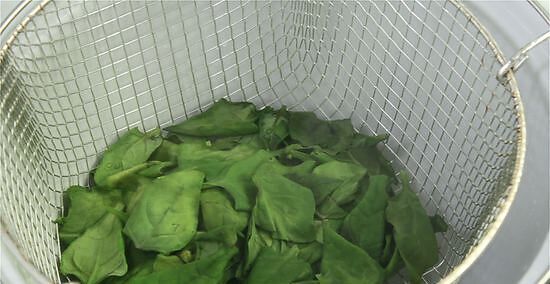
Steam the spinach. Try steaming your spinach by placing your rinsed baby spinach into a steaming basket and putting it into a pot with a small amount of water to boil for three to five minutes. This method cooks the spinach lightly and skips the draining step necessary for boiling. If you are pressed for time, you can also steam fresh spinach in the microwave by placing it in a microwave-safe bowl with a small amount of water, covering the bowl with a lid, and microwaving for 30 seconds to two minutes depending on your microwave and desired cooking level.
Cooking Frozen Baby Spinach
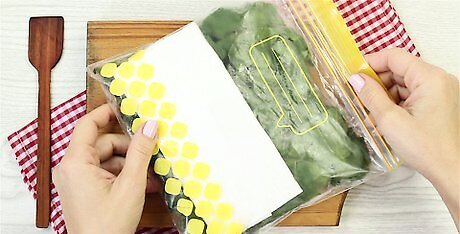
Remove spinach from the freezer to thaw. Let your frozen baby spinach thaw out in the refrigerator or out in the kitchen in room temperature in advance of cooking it. Place the frozen spinach into your refrigerator a day or two in advance, or into a room temperature environment if you can only thaw a couple hours in advance. Keep frozen spinach in its original packaging or in a sealed bag or container to prevent mess from excess liquid during thawing. Use a microwave to defrost the spinach last-minute if you could not thaw it in advance. Don’t microwave it long enough to cook the spinach, only to defrost it.
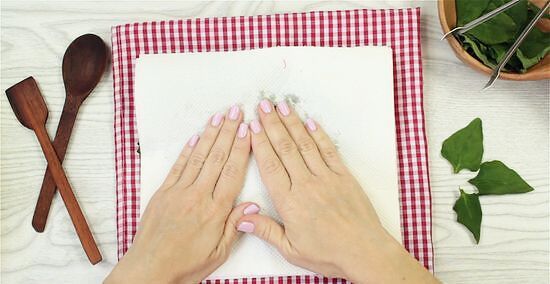
Drain excess liquid if needed. Remove the excess moisture created from thawing the frozen baby spinach, if desired, by squeezing or pressing the spinach lightly. You only need to remove extra liquid if you are intending to later add the spinach to a bread, souffle, dip, or another similar recipe for which excess liquid could create a problem or different outcome. Try placing thawed spinach into a cloth towel or a few paper towels and squeezing or patting it dry. Or, try using a potato ricer tool to press the liquid from the spinach. You may decide not to drain spinach for recipes that won’t be harmed by extra liquid, or could even benefit from it by adding extra moisture while cooking.
Saute the thawed spinach in a pan. Cook your baby spinach in a skillet by adding the thawed spinach to a nonstick pan and heating evenly. You can heat oil or butter over medium heat in the skillet before adding spinach, or simply use the natural water content of the spinach to protect it from sticking to the pan. Olive oil is a great, heart-healthy option if you go the oil route. Add your thawed baby spinach to the pan and gently stir or turn it with a spatula or tongs to heat the spinach evenly. You can cover the pan with a lid or simply continue to stir the spinach until it appears wilted and is heated through.
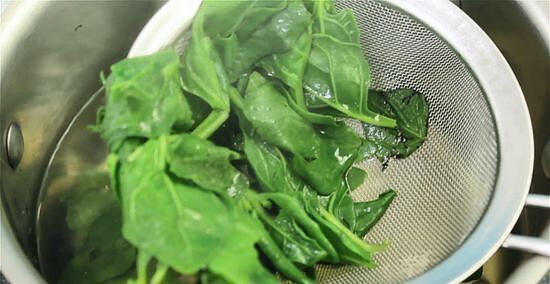
Boil the thawed spinach. Place your thawed baby spinach into a pot and cover it with water. Place the pot over high heat to bring the water to a boil. Leave the spinach in the boiling water for three to five minutes before removing the pot from heat and pouring the contents into a colander to drain. Use a steamer basket if you have one by filling it with spinach and placing it in your pot over a small amount of water. Boil the water for three to five minutes to steam the spinach and avoid the draining step.
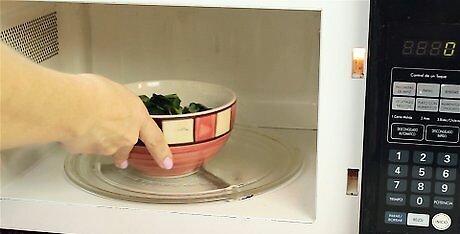
Microwave for quick cooking. Put your thawed baby spinach into a microwave-safe bowl and cook on high for 30 seconds to two minutes. This method works well if you do not have the time or materials to cook your baby spinach by another method. You may want to avoid draining the excess liquid from thawing, or add in some water, before microwaving in order to preserve moisture. You can also cover the bowl with a lid to keep steam inside.
Eating Cooked Baby Spinach
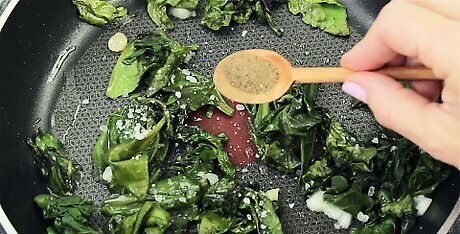
Add garlic, lemon, or other seasonings. Add oil or butter to add richness to cooked spinach, or common additions like garlic, onion, or lemon juice to add flavoring. If you use garlic or onion when sauteing spinach, chop and add them to the pan with a little butter or oil first to cook for a few minutes before adding in the spinach. A pinch of sea salt, black pepper, chili flakes, or any other seasonings you like can be added to cooked spinach as well. If you are boiling or steaming your baby spinach, add any additional ingredients or flavorings after you have removed it from heat and drained the water out.
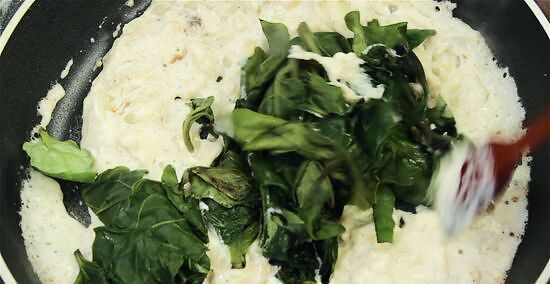
Cream the spinach. Create a popular cooked spinach dish by adding it to a mixture of whipping cream, butter, onion, garlic, and spices. Saute chopped onion, minced garlic, and butter in a skillet for about five minutes. Stir in the whipping cream along with nutmeg, salt, and pepper. Bring the whole mixture to a boil until cream starts to thicken. Cook your baby spinach using the boiling method, then add it to the pan with the cream mixture. Simmer uncovered for about two minutes until the whole thing is thickened. You may want to add additional seasoning to taste, like more salt and pepper, after the spinach is added in.
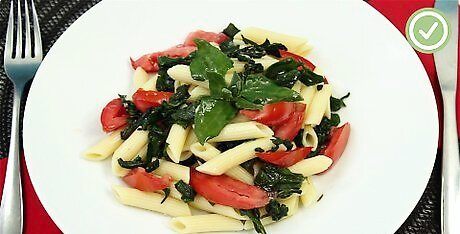
Drain spinach for use in other popular dishes. Cook your spinach and be sure to dry and drain it thoroughly for use in dips and baked goods. Try a spinach artichoke dip by combining cooked spinach with artichoke hearts, parmesan and mozzarella cheeses, mayonnaise, and seasonings for any easy party platter with chips, bread, or vegetables for dipping. Make spanakopita by layering phyllo dough with feta and ricotta cheese, eggs, and a mixture of spinach, parsley, garlic, and onions to bake into a traditional Greek pie. Add cooked spinach into any existing soup, like minestrone, or pasta dish, like lasagna, for a healthy addition of greens to your meal. Add it to a pasta or grain dish by draining the pasta or grain right over the spinach in a colander.




















Comments
0 comment